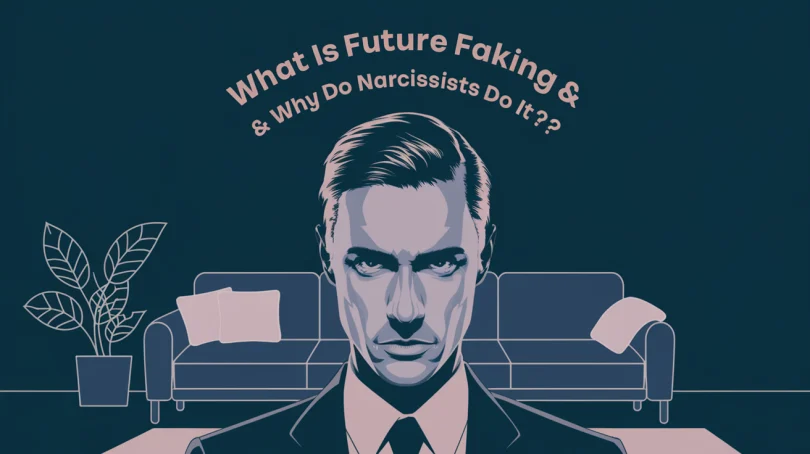Future faking is a manipulative tactic used in toxic relationships where someone makes exaggerated promises about a shared future, like talking about marriage or having children, without any genuine intention of following through. Their goal is to create a false sense of security and emotional attachment with the other person while having no real commitment to those plans.
While future faking is often discussed in the context of romantic relationships, it can also occur in friendships and even work relationships. For example, you might be promised a promotion or a raise to get you to do more work, only to find out later that those promises were never meant to be fulfilled.
The Emotional Impact of Future Faking
The emotional impact of future faking is devastating. It creates a powerful attachment to the person making the promises because you’re not just invested in them you’re invested in the future they’ve sold you. You might even find yourself dreaming of the things they mentioned, wanting that life and future with them.
Many of us take tangible steps toward the future we envision, such as putting down deposits on wedding venues, telling friends and family about an impending promotion, or making other commitments based on the belief that these dreams will become a reality. However, this emotional investment can create a sense of dependency, leaving us anchored to a future that may never materialize.
Over time, we can find ourselves stuck holding on to a vision that feels more and more like a mirage. Even when evidence begins to show that the dream is built on false promises, it can be incredibly hard to let go. We cling to hope despite the mounting signs that it’s no longer aligned with our reality, keeping us trapped in a cycle of waiting and disappointment.
Why Do Narcissists Use Future Faking?
At its core, future faking is tied to a narcissist’s need for control, validation, and power. By promising an enticing future, they keep us emotionally invested and focused on achieving goals that only serve their interests and feed their desire for attention and admiration.
Often, narcissists don’t even see these promises as deliberate lies at the moment they probably believe in their visions. But as their priorities shift, the promises become irrelevant, leaving us to grapple with the fallout.
Related Topics:
Do This to Psychologically Make Someone Like You
Top 5 Overlooked Dating Red Flags
10 HARSH Truths About Healing From a Toxic Relationship
4 Ways to Torture The Narcissist
The Psychological Toll
The psychological toll of future faking is significant. The cycle of hope and disappointment causes confusion, self-doubt, and dependency. You might question whether you’re the problem if you’re not doing enough, or if staying a little longer will finally make those promises come true. This emotional roller coaster keeps you tethered to the vision they’ve sold, rather than the reality of the situation.
How Future Faking Works as a Manipulation Tool
Future faking is a powerful tool for manipulation. By saying exactly what you want to hear whether it’s a dream wedding, a big promotion, or long-term plans—the narcissist directs your attention away from the present, where inconsistencies might be glaringly obvious. Instead, they have you focus on an imagined future, allowing them to influence your emotions and decisions.
This tactic creates emotional dependence, as you prioritize their needs and timeline while waiting for their promises to materialize.
Immediate Gratification for the Narcissist
Beyond long-term control, future faking also provides narcissists with immediate gratification. These promises serve their needs at the moment by keeping you invested without delivering on their words. For example, if they feel like they’re losing your attention or you’re beginning to pull away, a promise of an exciting future can quickly reel you back in.
If they want your compliance say, to overlook their bad behavior or go along with their plans they know that promises of future rewards or compromises can buy your cooperation.
Feeding Their Ego
Grand gestures, even in the form of words, can feed a narcissist’s ego. They know that promising something extraordinary, like a dream vacation or an engagement, will elicit excitement, gratitude, or even awe. In that moment, they’ve secured your emotional energy and validation, which is what they thrive on.
Avoiding Accountability
Future faking also allows narcissists to avoid accountability in the present. Promises of change or improvement like “Don’t worry, I’ll treat you better” or “I’ll get my finances in order” shift the focus away from their current behavior. By projecting everything into the future, they avoid addressing the reality of now. They’re essentially buying time, delaying any conflict or tough conversations by giving you hope that things will improve in time.
When the future they promised doesn’t happen, they often blame external circumstances or make you feel like you’re the reason those promises weren’t realized. The result? You’re left feeling confused, frustrated, and often doubting yourself, while they avoid responsibility and continue to enjoy the benefits of your energy and commitment.
Recognizing Future Faking
So, what can we do to better protect ourselves? Let’s talk about how to recognize future faking in our relationships. It can be subtle at first, but over time, clear patterns emerge if you know what to look for.
1. Big Promises, No Follow-Through
It might start with your partner painting an incredible picture of your future together maybe they talk about the dream house, the perfect wedding, or even a shared business venture. It all sounds amazing, but they don’t take any actions to move you toward those goals.
2. Words and Actions Don’t Match Up
This is a big one. They might promise you the moon and the stars, but their actions tell a completely different story. For example, they might say they’re going to save for the house you talked about, but they never seem to put any money aside. Or they promise to take the next big step, like introducing you to their family, but it keeps getting delayed with excuse after excuse.
3. They Avoid Talking About Details
Have you ever tried to nail down specifics on those big promises? Maybe you ask, “When are we going to plan that trip?” or “How are we going to save for this together?” Suddenly, they get evasive, brushing it off with something like, “We’ll figure it out later” or “Let’s not stress about it now.” That avoidance is a huge red flag.
4. You Feel Let Down Over and Over Again
Future faking happens in cycles. They make big promises, nothing happens, and you’re left feeling disappointed. Then they make more promises, and the cycle repeats. This repeated pattern of letdowns leaves you questioning what’s real and what’s not.
5. They Double Down When You Start Pulling Away
The moment you express doubt, they suddenly start talking about buying a house together or some other over-the-top promise. They know exactly what to say to keep you hopeful, like the one thing you’ve always wanted. These escalated promises are just another tactic to keep you stuck.
6. They Try to Isolate You from Friends and Family
Along with those big promises, the narcissist might try to pull you away from friends and family. They might say things like, “No one understands us like we do” or “It’s just us against the world.” At first, it can feel like your relationship is special, but isolating you from your support system is a huge red flag. It’s a way to make you more dependent on them and the relationship.
The Emotional and Psychological Effects of Future Faking
Future faking can have lasting emotional and psychological effects. One of the biggest impacts is on your ability to trust others. It doesn’t just erode your trust in the person doing it it can start to affect how you view relationships in general. You may find yourself questioning if you can believe anyone’s promises or intentions, making it hard to feel secure even if someone else’s actions are genuine.
Self-Doubt and Guilt
It’s very common for victims of future faking to blame themselves. You might start thinking, “Maybe I pushed them too hard,” or “Maybe I didn’t deserve those promises to come true.” This internal narrative is incredibly damaging because it shifts the responsibility away from the narcissist and places it unfairly on you.
The Emotional Roller Coaster
The constant cycle of excitement and disappointment takes a serious toll on your mental and emotional well-being. It can leave you feeling drained and questioning your worth. If you’ve felt this way, it’s not your fault. These psychological effects are a direct result of the manipulation involved in future faking, and recognizing that is a powerful first step toward healing.
How to Protect Yourself from Future Faking
Finally, let’s get into the ways we can respond to future faking and protect ourselves from having it happen.
1. Set Boundaries
Now that you recognize future faking for what it is, it’s important to set firm boundaries about what you’ll accept. If someone makes big promises but consistently doesn’t follow through, let them know that you’re only going to focus on what’s happening, not what they’re saying will happen. Boundaries aren’t about controlling someone else they’re about protecting your emotional space.
2. Focus on Actions, Not Words
Take a step back and look at their behavior. Are their actions consistent with what they’re saying? Or do they keep shifting goalposts and making promises? Words are easy follow-through is what counts.
3. Reach Out for Support
You don’t have to go through this alone. Reach out to people you trust for support. Sometimes, when we’re in the middle of a situation like this, it’s hard to see clearly. Having someone you trust to talk to can help you gain perspective and stay grounded.
4. Practice Self-Care and Build Resilience
Moving forward, focus on self-care and building up your resilience. Surround yourself with people who follow through on their commitments and who value your time and trust. Most importantly, give yourself grace. Healing takes time, but it’s possible to recover, grow, and reclaim control over your life.
Conclusion
We’ve covered a lot today how to spot future faking, understanding its emotional impact, and most importantly, how to protect yourself by setting boundaries and focusing on actions over words. Your key takeaway here is that recognizing future faking is a powerful first step. It puts you in the driver’s seat and helps protect your emotional well-being.
Remember, you deserve relationships built on trust, honesty, and follow-through, not empty promises. If you’ve been or are going through this, be kind to yourself. Healing takes time, but it’s possible to move forward stronger and more resilient.






